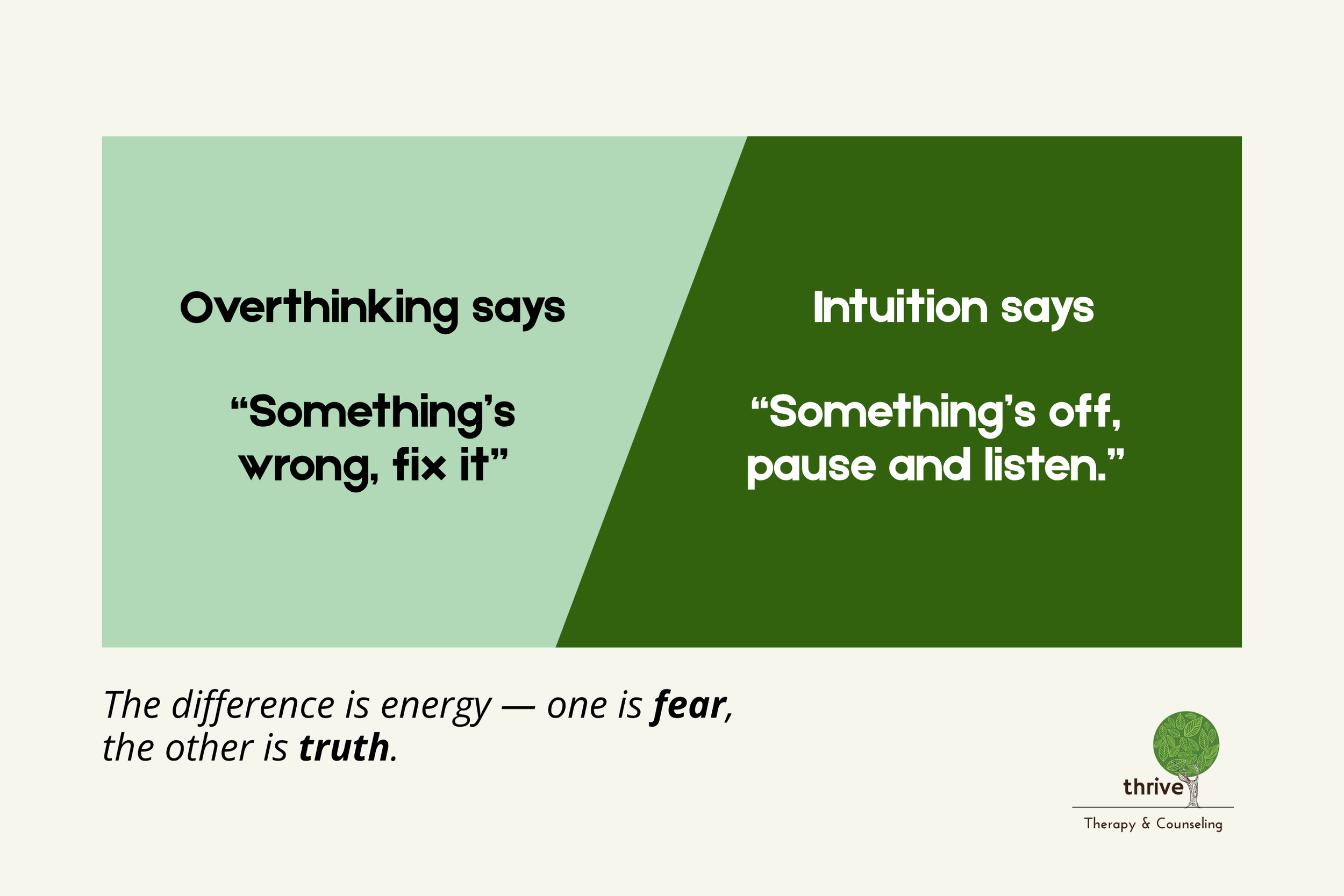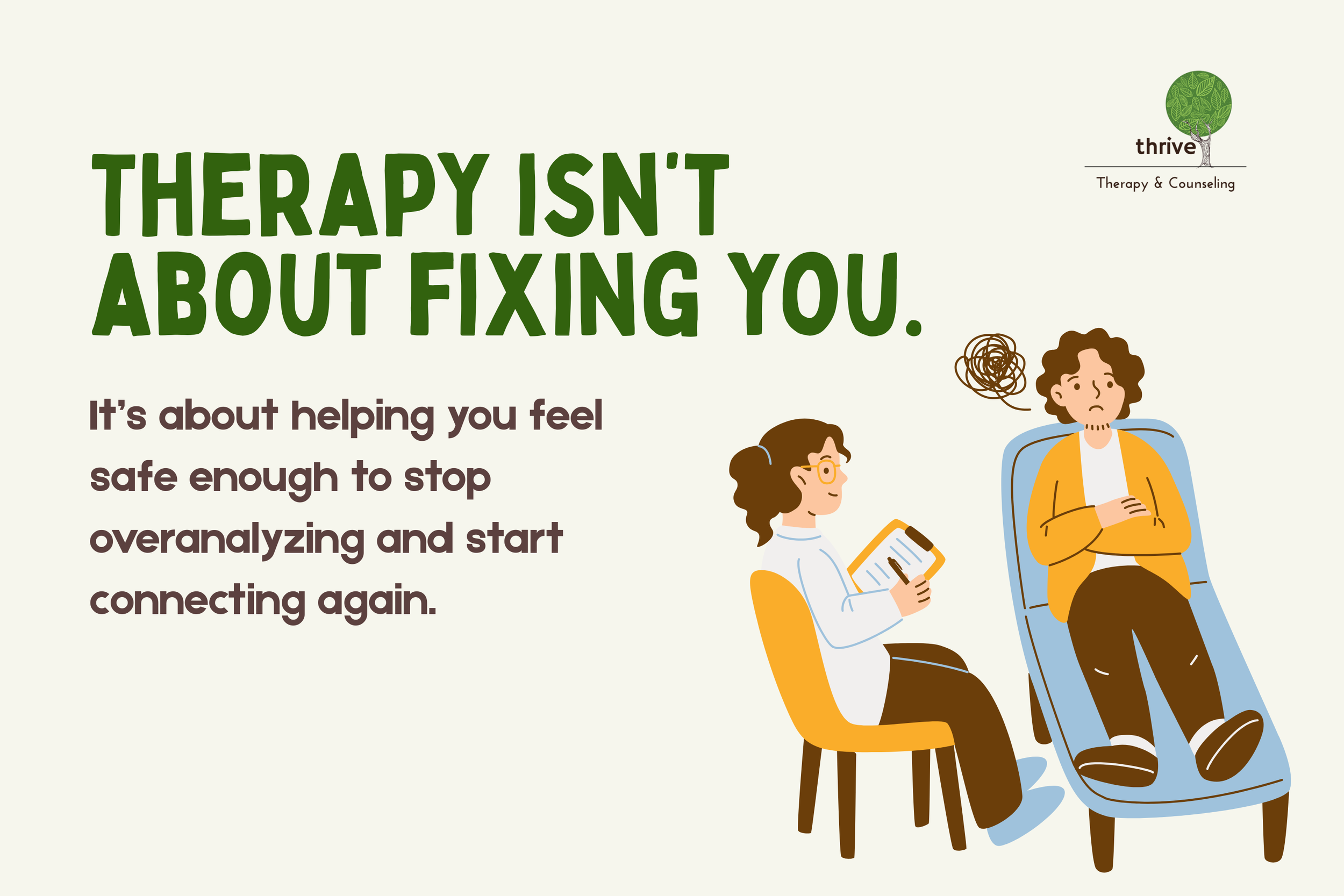Am I Overthinking My Relationship? 7 Signs to Look For
Ivy Griffin
Note - These types of overthinking can happen whether you’re dating, talking to someone, or in situationships, committed relationships, monogamous relationships, or ethical non-monogamous or polyamorous relationships. For the sake of clarity, this article refers to having a partner or a relationship, but this can refer to any romantic relationship structure.
If you’ve ever wondered if you’re overthinking your relationship, you’re not alone. In our online world of swiping left, getting left on read, and being more connected AND more disconnected than ever, it’s no wonder that your brain has a ton to worry about! It’s so easy to get caught up in an internal debate about when to reply, what to say, and how to interpret your partner’s responses.
The struggle is real.
And, the bottom line is - you think about your relationship so much because it matters to you. As a highly sensitive person (hsp), you care a lot about other people, and you crave a meaningful, connected relationship with your partner.
Add in how you feel your feelings deeply and how your brain likes to analyze every little thing, and it becomes super easy to worry about what’s going wrong, doubt your partner’s intentions, or hyperfocus on problems that don’t even exist yet. You can feel like your brain is stuck in a maze you can’t escape, and the more you try to come up with an answer, the less sure you are about what to do.
What Does Overthinking in a Relationship Really Mean?
When you’re overthinking your relationship, it’s hard to relax. You feel tense, uncertain, and on edge, and this gets in the way of the ongoing process of deepening trust and connection with your partner. This is true whether you’ve been with your partner for 2 weeks or 6 years. Doubt and uncertainty have this way of taking you out of the present moment and making you feel more distant and disconnected, which exacerbates all underlying fears you’re already having.
It’s a maddening cycle. Your brain becomes hypervigilant and tries to predict potential problems as a means of protecting you from getting hurt. But, this can make you focus more on the stories in your head, which may or may not be true. It’s then natural to withdraw, shut down, or lash out, none of which creates the closeness you really want.
At Thrive Therapy & Counseling, we provide a safe, supportive space to help you work through your thoughts, ease your mind, and build healthier ways to navigate your relationship. Connect with us here.
7 Signs of Overthinking in a Relationship
Constantly analyzing every text
This tends to happen more in new relationships. You may find yourself worrying and debating about how to respond ALL THE TIME, like:
“I’m thinking about him and want to say hi, but is it too soon? Will I seem needy?”
“Why did they use a period instead of an emoji? Are they upset?”
Why is it taking so long for her to respond? Is she busy, or is she starting to ghost me?
Comparison and self-doubt
This also happens more in newer relationships, but it can sneak up after you’ve been together for a while too. When you’re caught up in a cycle of overthinking, your inner critic likes to jump in and remind you about all of your insecurities, doubts, and anything you don’t like about yourself, which can sound like:
“They dated someone more attractive/successful/smart/talented before—why would they choose me?”
“They’re too good for me. I should probably just end it now before I get even more attached.”
“I’m too lazy/boring/quiet/messy. I don’t measure up to what they want.”
Replaying and analyzing conversations over and over
Maybe you had a fight. Or, you had a difficult talk about boundaries in your relationship. Afterward, your mind is like a runaway train. You keep thinking about exactly what your partner said and trying to interpret their body language and any underlying meaning. Then, you fixate on what you said, and you obsess that you didn’t get your point across and that you came on too strong or not strong enough and that you really should have said xyz instead…
Creating stories in your head
Have you ever created a whole story in your mind about how awful some future experience is going to be? Perhaps your partner was more withdrawn and quiet the past couple days, and you decide to check in with them about it this evening. You create a whole drama imagining how they will say that they don’t feel the same about you, and they’re doubting the relationship.
Then, you spend the entire day depressed and grieving, only to actually check in with your partner that evening and learn that they’ve been upset about a situation with their parents and it wasn’t about your relationship at all.
Pursuer/distancer tug-of-war
This is a pattern that can come into play based on your attachment styles and histories. When one person has tendencies of an anxious attachment style in romantic relationships and the other has tendencies of an avoidant attachment style, this dance occurs. If you run more anxious and struggle with a lot of worry about losing the relationship, you may cope by reaching out more, wanting to spend more time together, or seeking more reassurance from your partner.
Your partner is then triggered and pulls away more or puts up walls to protect themself, which triggers more of your anxiety and overthinking and leads you to reach out even more, and the whole cycle perpetuates itself.
Difficulty being present
When you’re thinking so much about every aspect of your relationship, your mind is far away. You get fixated on future worries, or you obsess about the past. You can’t see or enjoy what’s happening right in front of you. You also aren’t benefiting from building memories and positive experiences with your partner because your thoughts are a million miles away.
Feeling more anxious than connected
If you feel anxious about your relationship more often than you feel connected to your partner, you’re not getting to enjoy the benefits of being in a relationship. You might decide you prefer to be single, not because you’d rather be on your own but because it’s an escape from being tense, hypervigilant, and on edge all the time.
Normal Relationship Worry vs Relationship Anxiety
No relationship is perfect, despite the fairy tale narrative we’ve all been fed. Everyone doesn’t feel heard or understood by their partner sometimes, and everyone fights or feels disconnected from time to time. We all have our unique needs, and no other person can always meet our needs.
These moments of imperfections in our relationships naturally trigger anxiety, doubt, and overthinking. In order to consider whether you’re having a normal reaction or whether the overthinking has moved into a more clinical level of anxiety, I recommend that clients ask themselves:
How often do you feel anxious about your relationship?
Once or twice a month?
A couple times a week?
Every day?
Multiple times a day?
The more often you’re feeling anxious about your relationship, the more likely it is that your anxiety has reached a level that would really benefit from some professional help.
Of all the time you spend thinking every day (and for hsps this can be a lot with our active minds!), how often do you worry or fixate on issues in your relationship?
Give it a percentage.
If you’re spending 30% or more of your time worrying about what to say or do in your relationship, that’s a lot of your day! It’s likely that your anxiety has deeper origins, and it could really help you to connect with a therapist or support group to begin addressing the underlying issues.
Is this a pattern in your relationships (or not)? Have you engaged in the same kinds of overthinking in past relationships, or is it new to this relationship? If it’s new, what’s different about this relationship?
If it’s a pattern, therapy can be a safe, supportive space to unpack your origin story and work on creating different patterns.
If it’s this relationship, it can help to dig in to journaling, self-reflection, and seeking feedback from people you trust. Whether from a friend or a therapist, sometimes we need to hear from someone who’s outside of the situation to get more perspective.
At Thrive Therapy & Counseling, we provide a safe, supportive space to help you work through your thoughts, ease your mind, and build healthier ways to navigate your relationship. Connect with us here.
How Therapy Helps You Stop Overthinking Your Relationship
When clients have a pattern of overthinking in their relationships, I often use psychodynamic and attachment-focused therapies in our work. So much of how we learn to relate to other people comes from the family we grew up in and how we saw our loved ones connect with one another.
We’re very social creatures as humans, and we learn the most about relationships from what we’ve had modeled to us. Through therapy, we unpack this history and help build your self-understanding to lay the foundation for developing new ways of responding.
Our attachment style forms first in the context of the relationships we had in childhood. So, if you’re struggling with insecurity and anxious relationship patterns as adults, these roots probably go way back. But, there’s good news! Our brains are very flexible and adaptable as humans, and we can create new patterns throughout our lives.
And, if you didn’t get the best examples when you were growing up, it also helps to learn better tools through therapy. I love teaching clients the practical skills of Dialectical Behavior Therapy (DBT) to help fill in any gaps. Plus, I honestly think everyone would benefit if we learned more interpersonal relationship skills! I find these tools really helpful in my own life, and I wish we were taught them in school.
So, if you’re struggling with overthinking in your relationship, please know you’re not alone. But, it can be hard to face this challenge all on your own. If you’re seeking more clarity and peace of mind, connect with us to book a session. We’d love to help.



